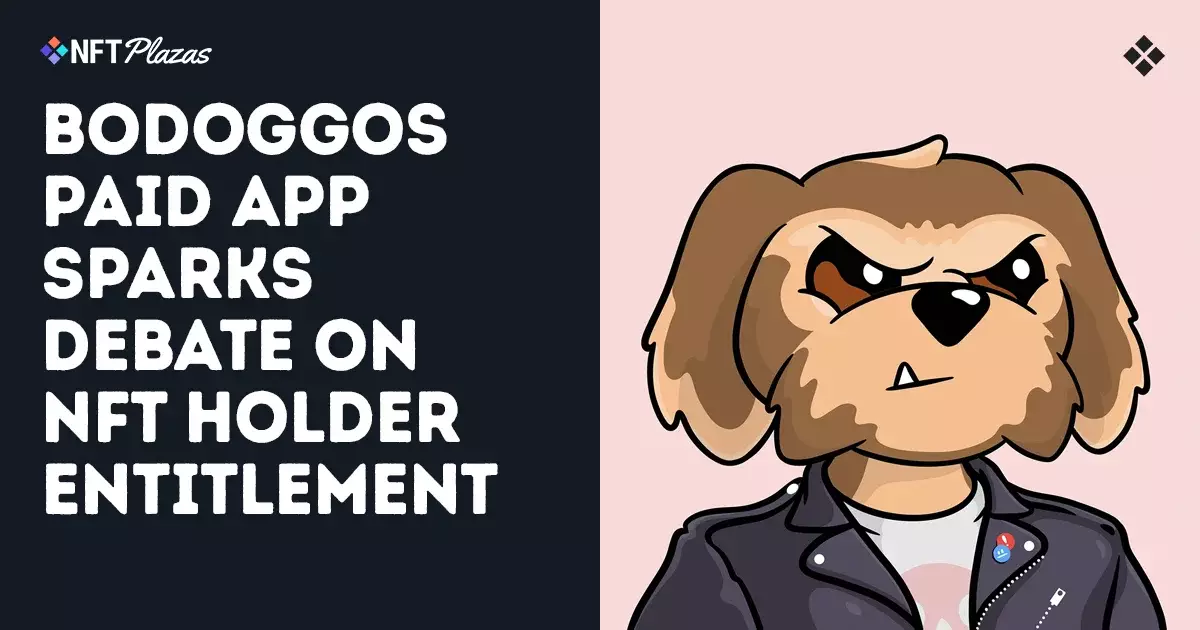The world of Non-Fungible Tokens (NFTs) has evolved dramatically since its inception, emerging not just as hype-fueled collectibles but as a complex ecosystem of digital ownership and community engagement. This landscape can sometimes veil the uncomfortable truth about what NFT holders believe they are entitled to versus the realities faced by creators and project teams. The recent uproar surrounding the BoDoggos project encapsulates this serious yet often unacknowledged disconnect. A simple tweet ignited a flame of controversy, illustrating the stark contrast between the expectations of NFT holders and the operational challenges of the projects they support.
NFT holders, many of whom invested in these digital assets expecting free access to future products or services, were taken aback when BoDoggos indicated that a subscription would be required for access to their new trading app. Conversations exploded across social media platforms, revealing an industry grappling with rigid ideologies. Does a one-time investment guarantee lifetime benefits, or do project creators have a legitimate need for recurring revenue? This fundamental question lies at the heart of the discord and is emblematic of a broader debate that transcends just the BoDoggos example.
The Zero-Sum Game of Entitlement
As the dialogue unfolded, it became clear that many NFT holders harbor the belief that their purchase should result in continuous returns. This sense of entitlement can create tensions, especially when creators attempt to monetize their innovations. As industry experts pointed out, the notion that an initial investment should yield endless rewards is harmful not only to creators but to the entire Web3 space. BoDoggos’ decision to introduce a subscription fee revealed a harsh reality: operational costs are a constant—servers need to be maintained, developers must be paid, and innovative features they promise need funding.
For many, this sentiment may seem counterintuitive; after all, isn’t the essence of NFTs about community and shared ownership? However, a prosperous ecosystem requires developers to remain solvent and profitable. When discussions turn into heated debates, as they did in the relentless back-and-forth over BoDoggos, it’s essential for the community to reconcile its feelings of entitlement with the tangible realities of project sustainability.
Valuing Creative Labor in a Digital Economy
It’s time for those who engage in this digital economy to recognize that the creators, the ones pushing the boundaries of what’s possible, deserve fair compensation for their labor. The Ventura Count of the NFT space is walking a tightrope, where the excitement of initial investment can blur the lines around equitable treatment of creators.
One prominent figure in the debate, Leon Abboud, articulated a truth that resonates profoundly: the NFT sector’s biggest hurdle is overcoming the belief that one-time purchases create unending privileges. To genuinely support the growth of this industry, community members must recalibrate their expectations, understanding that creators need to be rewarded to foster innovation rather than being perceived as profit-seeking entities.
Examining Different Perspectives
The controversy erupted not only among NFT holders and creators but also polarizing opinions across the Board. Some advocated for a creator’s right to charge for ongoing value, while others argued that sustainability and community growth should prioritize free or subsidized access to products. Meanwhile, industry veterans like Matt Medved highlighted the dual pressures of maintaining a viable business while delivering value to partners and investors. This reflects deeper-rooted tensions that resonate throughout many emerging fields—balancing idealism with practical necessity.
Members of the BoDoggos team defended their model, pointing out that every project incurs expenses beyond the expectations of holders. Therefore, it’s crucial that both sides find common ground, one where continuous support doesn’t come at the expense of developers’ viability.
A Call for Cooperative Evolution
The NFT space stands at a crossroads. As the debate reaches fever pitch, stakeholders must come together to reexamine what it means to participate in this industry. Rather than staking claims grounded solely in entitlement, we must foster a culture of collaboration where both sides—creators and holders—can thrive. Sustainable revenue models are not only a lifeline for developers but a pathway for future projects to deliver exceptional value to their communities.
By nurturing an environment of mutual respect and understanding, the NFT universe can shift from conflict to innovation. Only by working together can these digital assets realize their full potential and transcend misconceptions rooted in entitlement. This calls for collective evolution—an essential step toward nurturing a more sustainable, thriving NFT landscape that benefits everyone involved.


Leave a Reply